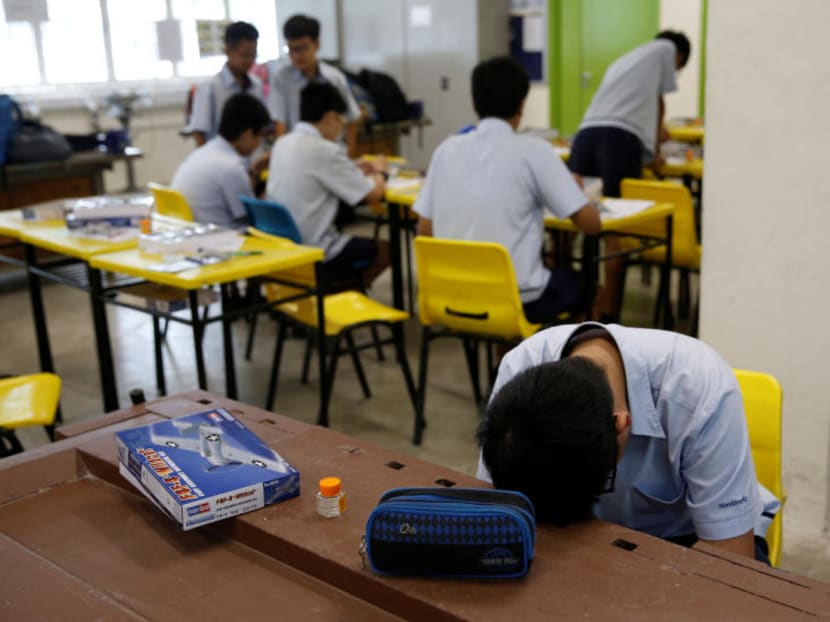Education system, society can afford to loosen up more: Ong Ye Kung
SINGAPORE — The education system must be “loosened up” to reduce stress on students, Education Minister Ong Ye Kung said, adding that Singaporeans can do without the “do or die” mentality where national examinations are seen as the be-all and end-all.
SINGAPORE — The education system must be “loosened up” to reduce stress on students, Education Minister Ong Ye Kung said, adding that Singaporeans can do without the “do or die” mentality where national examinations are seen as the be-all and end-all.
Speaking to students at the opening ceremony of this year’s pre-university seminar at Nanyang Technological University on Wednesday (May 30), Mr Ong talked about alleviating the pressure-cooker environment in schools.
He said that students’ stress levels have gone down generally for primary school children over the years, due in part to schools not having exams until the end of Primary 2, and having a more streamlined curriculum where “young students have a lot more (time) to do other things, other than studying”.
However, the “workload is still quite high” for secondary school students, as well as those in the junior colleges, polytechnics, he noted.
In that regard, Singapore needs an education system where there are many “checkpoints”, so that “if you miss one checkpoint, or don’t do that well for one checkpoint, it’s not the end of the world”, he said.
“We must remove that do-or-die mentality for every checkpoint, so that even if you don’t do so well, it’s okay… You can come back and make good again… so the system must be loosened up in that aspect.”
The Ministry of Education (MOE) is already taking “active steps” in that direction, including the recent move to replace the Primary School Leaving Examination (PSLE) T-score system with a wider, banded scoring system from 2021, Mr Ong said. This takes away some of the stress of comparisons among students that are done “so tightly”.
Then, there are the changes to the Direct School Admission (DSA) scheme, which will do away with general academic ability tests for secondary school students. The admission scheme allows students to gain direct entry to secondary schools or junior colleges based on their talents and achievements in non-academic areas such as sports and the arts.
When the changes were announced early last year, MOE’s stance was that the general academic ability tests put undue focus on students’ academic strengths rather than identifying their other specific strengths.
“We are trying to go back to the original objective of the DSA system, to recognise students of different abilities,” Mr Ong said on Wednesday, “not just academic but different characteristics like leadership (qualities)… so this yardstick to move to a secondary school of choice is widened.”
At the polytechnic level, to give “flexibility” in the way students are admitted, there was the introduction of the Polytechnic Early Admissions Exercise — an aptitude-based system that allows students to apply for and receive conditional offers for admission to polytechnics before they get their final grades.
Mr Ong said that in reality, people are more likely to “intersperse” studies and work together in the modern world, and they should not think that one has to come after the other.
At the Singapore Institute of Technology, about 20 per cent of its students have two or more years of working experience (which excludes National Service) before they began their studies. This is because many polytechnic students may enter the workforce to gain experience before applying to university, he said.
He urged other students with less than “stellar results” — but are looking to apply to university — to also get into the workforce first, because academic results now “weigh less” than work accomplishments, and universities would also take work experience into account.
On the subject of stress, Mr Ong reminded students about the importance of maintaining their mental well-being, to look out for those who may be struggling with issues, and to communicate with their parents regularly.
He also urged them not to be “too hard” on themselves, especially when they are in the middle of juggling multiple school commitments, work, and home responsibilities.
Pointing out that while Singapore has a good education system that is well-regarded around the world, there is always room for improvement.
“If (you) spend so much time chasing the last mark, always (being) so hard on yourself, it’s not good for your well-being and it can reduce the joy of learning,” he said.
Students must love learning — which is “a fun process, about curiosity and about wanting to explore the world” — and have a resilient attitude which is even more important when faced with an exciting but fast-changing future.
He added: “We will be thinking hard on how to further improve the system, but whatever we do, we will need the support of educators and students, (to) know where we are coming from and why we do certain things.”










